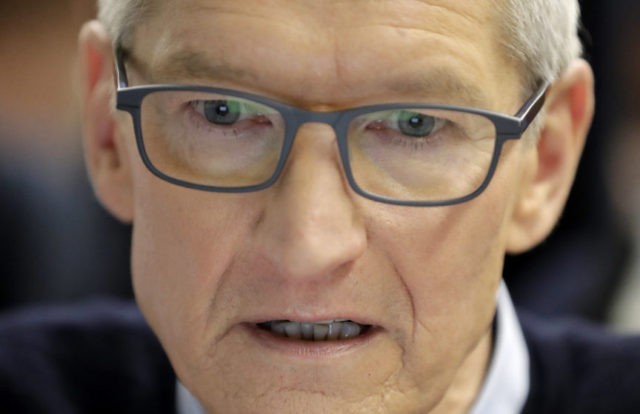Lobbyists for Apple and Google have reportedly descended on Arizona as the state considers legislation that would allow app developers to use third-party payment systems to circumvent the 15 to 30 percent cut that Apple and Google demand from app sales.
Protocol reports that Arizona State Rep. Regina Cobb (R) had not yet even formally introduced her app store legislation last month when suddenly Apple and Google lobbyists descended on the state.
Apple worked extremely fast, having its own lobbyist Rob Diridon begin lobbying in Arizona before hiring Kirk Adams, the former chief of staff to Arizona Governor Doug Ducey and speaker of the Arizona House of Representatives to negotiate with Cobb on behalf of the firm.
Apple quickly joined the Arizona Chamber of Commerce and began lobbying against the bill while lawyers for both Google and Apple went to the Arizona House’s lawyers to argue that the bill was unconstitutional. Cobb stated: “We went through a very difficult weekend where Apple and Google hired probably almost every lobbyist in town.”
Cobb’s bill would allow app developers to use third-party payment systems to circumvent Apple and Google’s 15 to 30 percent app sales fee.
Protocol reports:
In the three weeks since Cobb introduced her bill, Arizona has become an unexpected hotspot in the country’s antitrust debate, with the full force of the country’s progressive anti-monopoly movement lining up behind a cadre of small- to medium-sized developers against an aggressive army of Apple and Google lobbyists. HB2005 could pass the House this week and potentially even make it through the Republican-majority Arizona Senate, making Arizona the first state to push through legislation to loosen Apple and Google’s grip over their app ecosystems in the country. There’s similar legislation being considered in Minnesota, Georgia, Hawaii and other states, mostly being pushed by Match Group, Epic Games and the broader Coalition for App Fairness, which only formed last year and includes Spotify, Tile and others.
Cobb said she was first approached by Ryan O’Daniel, a local lobbyist who represents Match Group and the Coalition for App Fairness, in early February with the idea that would become HB2005, an amendment that would force smartphone app stores to allow third-party payment systems.
“I felt like it was a good idea right away,” Cobb told Protocol. She’d worked with O’Daniel before, and she was compelled by his argument that the legislation could create new economic opportunities in Arizona. Cobb, the chairwoman of the Arizona House Appropriations Committee, decided to put her political muscle behind it and eventually had it assigned to her committee. Over the past two weeks, she said, members of her committee have faced a barrage of lobbying efforts from free market groups, the Arizona Chamber of Commerce, and of course, lobbyists retained by Apple and Google.
Last month, Breitbart News reported that the North Dakota state senate voted 36-11 not to pass a bill similar to Cobb’s that would force Apple and Google to allow software developers to use their own payment processing software.
The vote is a victory for Apple which has long claimed that the App Store is a core part of its product and that tight control over the App Store is required to keep iPhone users safe from malware and scams.
Breitbart News recently reported on the scam apps plaguing Apple’s App Store, some of which have generated upwards of $5 million in revenue from unsuspecting iOS users. Apple receives a 30 percent cut of all payments made through the App Store.
The North Dakota bill was the first major U.S. state-level legislation to address the Apple and Google app stores. The bill targeted Apple’s fees by requiring companies that make more than $10 million per year in the state through app stores to offer alternative payment processors for purchases through the app store, allowing developers to avoid Apple and Google’s payment processing fee.
Apple opposed the bill with Erik Neuenschwander, an Apple official who focuses on privacy engineering, stating that the bill “threatens to destroy iPhone as you know it.”
Neuenschwander stated: “Simply put, we work hard to keep bad apps out of the App Store; Senate Bill 2333 could require us to let them in. For a store owner, that would be like the government forcing you to stock your shelves with products you know lack in quality, authenticity, or even safety.”
Despite the failure of the North Dakota bill and Apple and Google’s aggressive response to the Arizona bill, Cobb is not deterred. “I’m sure other states are going to be watching from the sidelines. On both sides, I think they’re going to start navigating a little bit more precisely after they’ve been able to gain knowledge from this experience in Arizona,” Cobb stated.
Cobb stated that the aggressive strategy employed by the tech giants has made her more determined to pass the legislation. “I felt like, if they could do this to me, they could do this to smaller companies also,” she said.
Read more at Protocol here.
Lucas Nolan is a reporter for Breitbart News covering issues of free speech and online censorship. Follow him on Twitter @LucasNolan or contact via secure email at the address lucasnolan@protonmail.com

COMMENTS
Please let us know if you're having issues with commenting.